Why teach, if you develop more profitable. Conversation with geekbrains
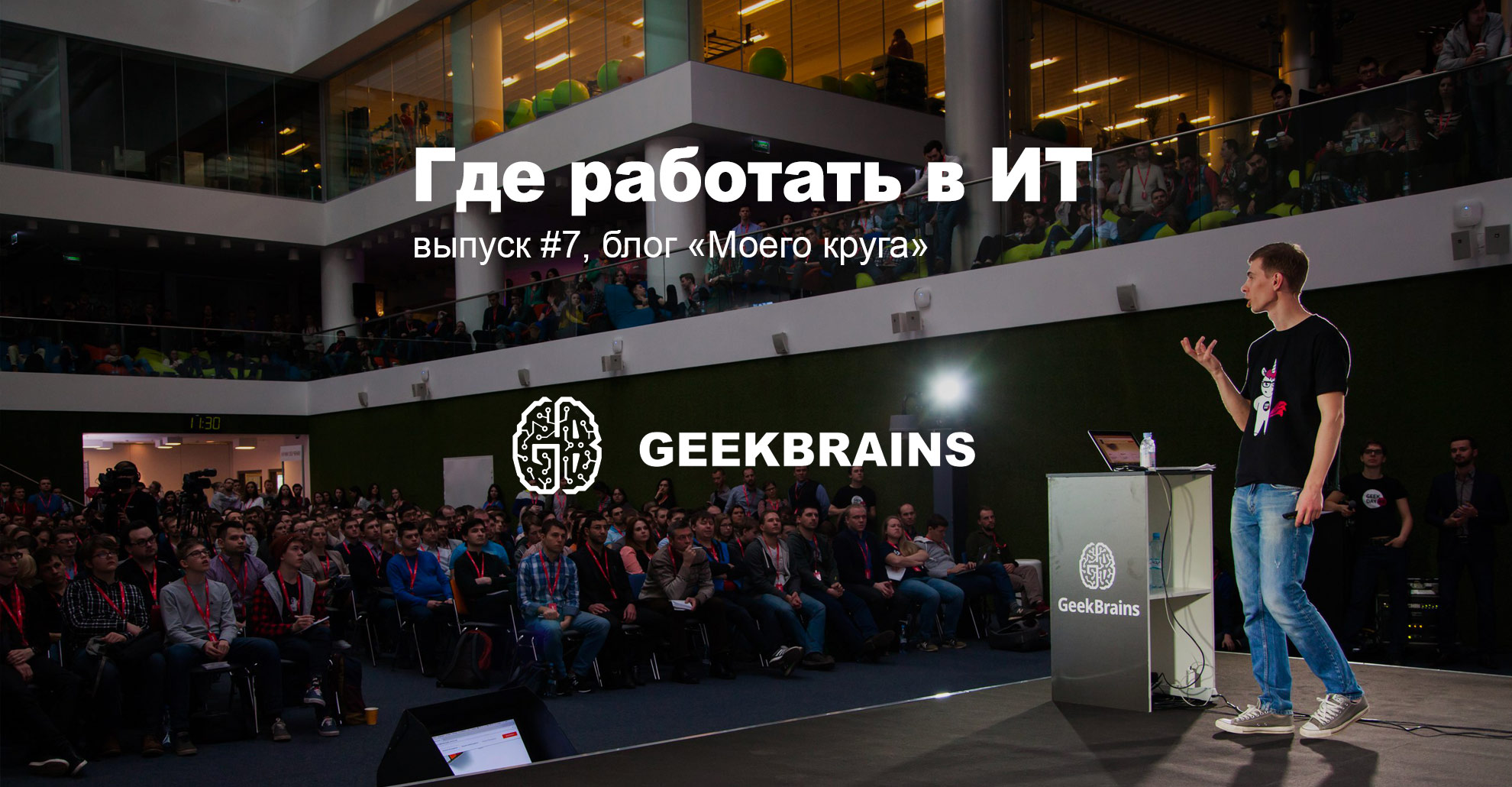
Probably, the people of my generation remember how their parents used to say to them: “Go to law school, economist, manager or foreign language, then there will be work and money”. It was an eerie cult of rejecting technical professions. Parents saw what happened to them - Soviet technicians - in small cities. All enterprises and factories were shut down, their salaries were not paid for half a year, and those who did not drink themselves went into the trade. Bought there, sold here - that’s what you should be able to do.
How quickly the world has changed.
IT has become ubiquitous and - to put it in words - "prestigious." Industry, where everyone wants. There, it turns out, not a diploma, but a skill is important. There for a month you can earn an annual salary of parents. And in order to “get into IT” you just have to be smart and diligently diligent, almost without risks.
Demand creates supply, and now the programmer of you is ready to do in half a year, bypassing the old ten-year rituals of getting a profession.
Good or bad, I do not presume to judge. We have talked with fillpackart with Alexander Nikitin, the founder of GeekBrains, one of the largest educational portals in Russia , about what online courses are, who teaches them and how they are trained on them .
Geekbrains received an average rating of 4.0 from its employees, who highlighted interesting tasks and professional growth. But the most important criterion for evaluation was “The company makes the world better”.
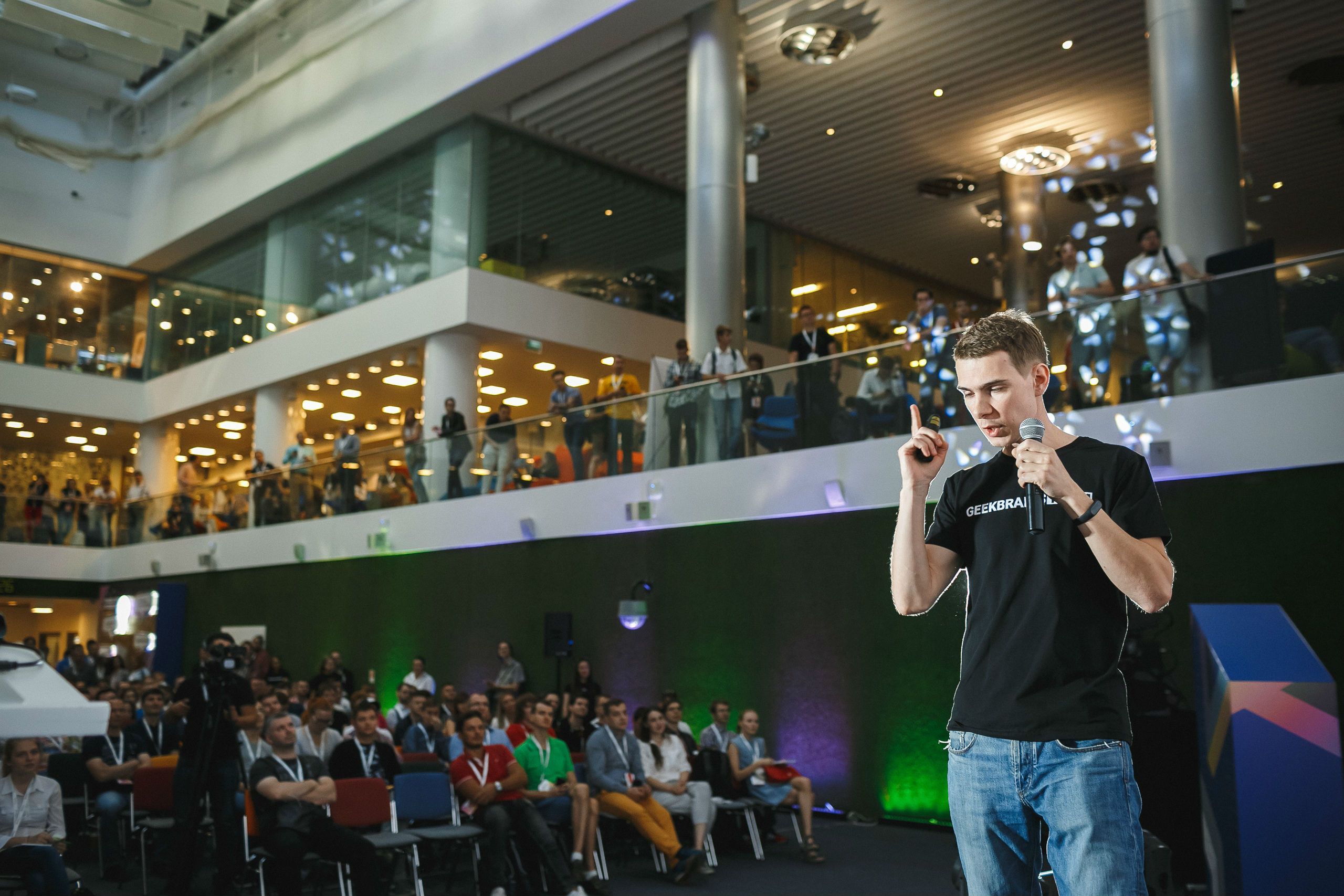
Alexander Nikitin
- I studied as a programmer at Baumanka. Finished, worked for a while. He knew how to write PHP sites, he knew the standard stack - JavaScript, html. Implemented Siebel CRM systems, Oracle. Maybe I was overconfident, but I thought I was a very good programmer. For six years we were tormented by the development in Baumanka, driven by tasks and different languages. In fact, it was a very cool school.
Then I was drawn to do business. It was 2010, while online training, webinars and infobusiness only gained first popularity.
Two thoughts have grown together in my head that I can program and can learn it online. Together with a group mate, I launched a blog - it was then called “School of Programming”. We wrote articles about how to do things right, began to conduct the first courses, webinars.
So everything grew out of a WordPress blog. We had a business card site: "here are our teachers, here are our courses, come learn." For some time we conducted offline classes, but then we abandoned them. Concentrated only on online, so as not to be sprayed.
- Why didn't the offline go?
There are more hemorrhoids. Offline is much harder to scale. It is necessary to open a bunch of centers around the country to collect groups. In terms of the ratio of benefits and investments, it seemed to us that it was better not to do this, but just go online and concentrate on it. Concentration in business - and not only - is a very useful thing.
- (Phil fillpackart ) And from your point of view online is not inferior in quality to offline?
Of course, offline is more efficient. What to hide - when you sit in front of the teacher, contact with him is much better.
On the other hand, if you study online, you can study at a district center in Siberia with a very cool teacher from Moscow, a tough specialist, a teacher from God.
- How did the course look like then?
The first course looked very funny. It was called “PHP in two weeks” - I personally led it. It was in the format of webinars, but only audio, without a picture. We were broadcasting like radio, we sent out manuals, training materials before classes, said “look at line 17, there’s such an operator written, find an error in it”. Feedback was in the form of chat.
Then, of course, we began to conduct typical webinars, where the content part was shown on the screen.
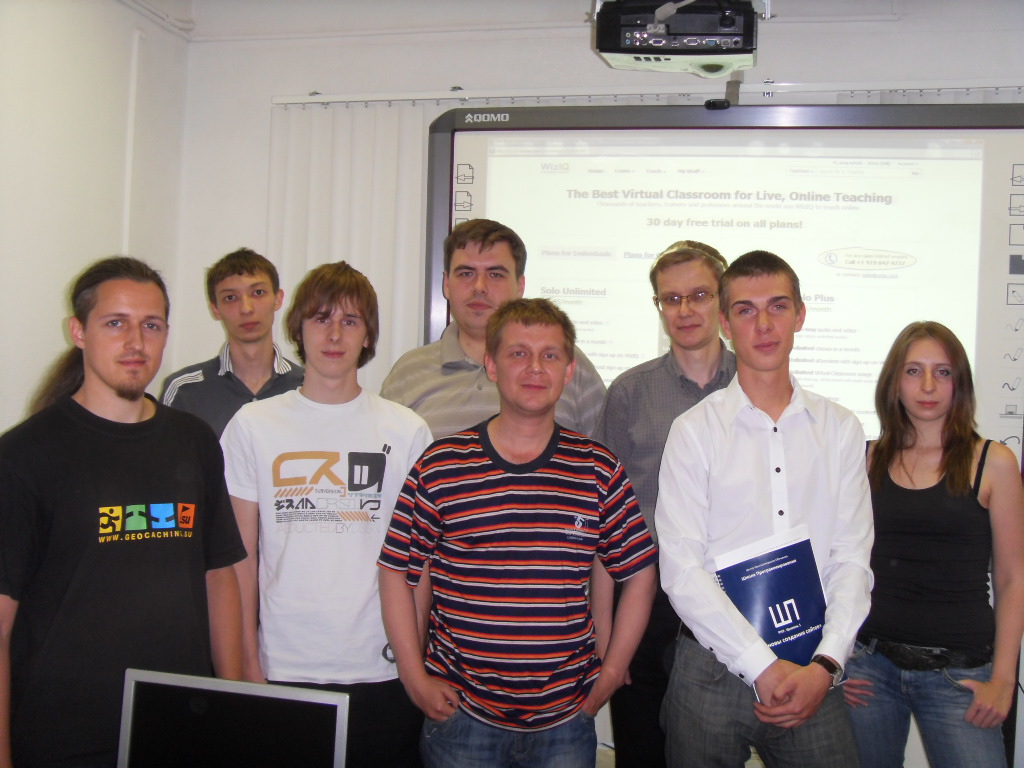
Team GeekBrains (then “School of Programming”) in 2011
- The first course was about PHP. And how did you choose next?
After the first course, which lasted two weeks, we swung to the big summer three-month course - it was called “Web Guru”. We were repelled by the technology stack that a person needed to be a full-fledged developer. If we take the web, then this, of course, JavaScript, html and some frameworks. Then jQuery was very popular.
Personally, my oldest student was 82 years old. In fact, this is very cool, when a person at that age is interested in something else. He studied just for himself, wanted to make a website, I don’t know about anything - perhaps about my life. Some people are very young at heart and at 80, they are vigorous, active, want to live and develop. And this is very cool.
- (Phil) Now it seems that you have courses in general in all technologies that are at least used somewhere. Have you set yourself the task of covering everything?
I would not say that the task was exactly that. Rather, we looked that can be popular, that demand. You see, we have been around for a long time - soon there will be nine years. For nine years, you can create many programs.
In fact, we even have a reverse process. We closed the Ruby courses - although we developed it ourselves. They were not very popular, and again the rule was that it was better to concentrate than to dissipate.
In 2010, it was even difficult to call us a company - three people were engaged in everything, and we were repelled simply by the opportunities we have. There was a familiar classmate, a C # programmer. And we began to teach Sharpe, he conducted courses with us.
How GeekBrains lives in Mail.Ru Group
- And when did Mail.Ru Group appear?
They appeared much later. In 2014, we became not so much a learning center, as a developer community, where you can read articles, chat on the forum, watch free webinars. Renamed from “School of Programming” to GeekBrains. In 2015, there was a very powerful takeoff. This was noticed by Mail.Ru Group, I don’t know how.
- And how do you like them?
Yes. In fact, this is a very popular question - it is clear why. But I fully realize that I can say that I like it very much - this is the complete truth. Obviously, there are cons of a large corporation, some bureaucracy. But we imagined what Mail.Ru Group was at the time of the transaction. We have been like this for two and a half years, and there were no unpleasant surprises.
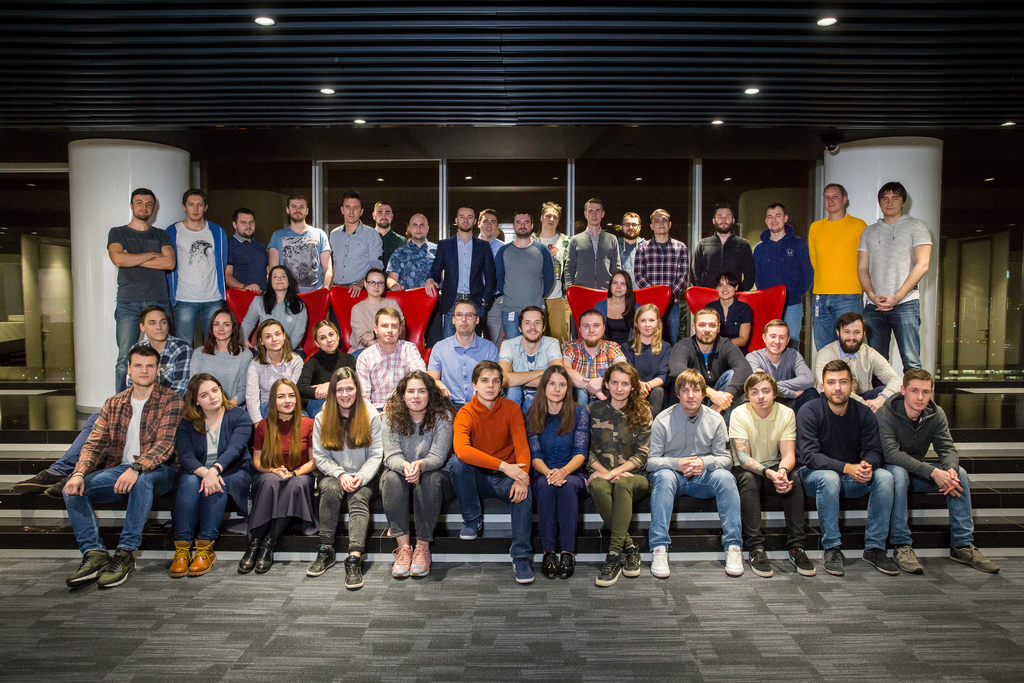
Team GeekBrains in 2018
- And at the very moment of the transaction, you did not doubt?
No, because you get tired of being a start-up for seven years, you want recognition, reliable rears, solid ground under your feet. In general, we wanted to get into the "Mail".
- How independent are you in the “Mail” framework?
When we were discussing a deal, it was important for us to maintain a large part of our independence in making strategic decisions. We saved it. Mail has service departments that serve all the business units of the group. For example HR, financial department, accounting. There is, of course, a brand, a great access to market expertise - there are a lot of people with whom to talk, to call to teach, just to learn.
- How now GeekBrains looks behind the scenes?
We currently employ about 90 people. I do not include teachers, there are several hundred of them. Teachers work mainly on a piece-rate basis. Usually it is practicing programmers who come to us to conduct classes as a hobby.
And in the state everything is standard - there are departments that can be found in most companies. Marketing, sales, quality department, production department, which makes videos, development, design, analytics.
- (Phil) Do your developers work together with the developers of Mail?
Our system is written in Ruby on Rails, and there are no Ruby projects in Mail. So, not really happened. But our developers have a profit from “Mail”, because a lot of internal meetings are held on new technologies, progers get together, share thoughts and news.
But from the point of view of development, no, ours are sawing their own, “Mail” - its own.
- (Phil) Did “Mail” not revise your projects technically?
You can say no.
Who and how come up with training programs

- Who in the permanent team is engaged in the courses themselves, invent them, find teachers for them?
About 10 people are engaged only in the development of courses. We have directions: training in programming, design, marketing, management. Each direction has its own leader, and he has his own team - methodologists, managers. They work only within the framework of their direction, communicate with teachers, make up programs.
Each program consists of blocks. If we teach web development, it is first html, then server language, then frontend. There are Methodists who make sure that the blocks are joined.
- How do courses appear - from idea to first class?
Ideas for basic courses on the surface. We are a commercial project, we earn money on training, and to some extent have to make products that will be of interest to a wide audience. And what is interesting to a wide audience, it is clear if you are inside the market.
We conduct regular surveys, but they rather confirm our hypotheses - what we ourselves would like to launch.
Next thing technology. The departments in the areas of work come in, experts, methodologists who are responsible for the general idea of the program are selected. Next in blocks we communicate with experts, coordinate the content and begin to do it.
- How deeply do methodologists understand the design?
Often these are former programmers. I don’t know if programmers are ex.
- Phil, are there former programmers?
- (Phil) No.
So the Methodists are just programmers, since they are not ex.
- What is more difficult - to develop a course or sell it?
I do not know, seriously. These are so different things. Sometimes it happens that sellers say: “Sales is the most important, the most difficult, the most necessary. And this is your portal development - complete garbage. " And someone says the opposite. And that's where the truth is? Everyone is engaged in his own business, and thank God.
- Well, you, as a person who is above it, can see where more resources, time, people go?
Even in people, the number of methodologists and the number of sellers are about the same. I can not even pick out the metrics by which to objectively evaluate it. By the number of hours spent in the office? Methodists and sales people just spend the most time in the workplace.
I tend to represent this as a single organism. It is strange to say that the liver is not as important as the heart. Each department, each person is important in its own way.
Where do programming teachers come from

- How do you hire teachers?
We take existing programmers, because very few people are looking for work directly as a teacher. We offer them to try themselves in this role. Then there is a whole chain of actions, interviews, and preparations. The man conducts the first free (for students) webinar.
We get acquainted, watch feedback on his free events. If we see that everything is okay, then we start to put it on the groups of pay.
- How does Eichar understand that a person wants to be a teacher if he is just a practicing programmer?
Hell knows, to be honest.
(offscreen laughter)
We can search for recommendations, we have a couple of thousands of Mail programmers sitting at our side, there is someone to turn to. But I just don’t know the subtleties of HR work.
We find programmers, ask if you want to teach. Perhaps they already teach somewhere. If they are interested, they start a discussion.
- (Phil) That is, there is no definite pattern and exact criteria that this is a good teacher, and this is not?
A good teacher is someone who has high marks on our website. When we conduct candidates on the way to the first group - free events, interviews - eychary can predict a lot. Build hypotheses about how successful he will become a teacher. And when he conducts the first webinar, everything becomes clear.
In general, we check in practice.
- (Phil) Are there any problems with the fact that almost all teachers are remote?
It seems to me no.
- What kind of work schedule do they have?
If we are talking about one group, it is usually two classes a week. Conventional Monday and Thursday, about two academic hours, plus checking homework assignments, chatting with students.
- (Phil) And how do you control their work? Is there a performance evaluation system for you?
When a person conducts a webinar, it is difficult to influence at that particular second. You can understand after the fact, it turned out or not. To understand this, there are assessments of each lesson. We see the big picture: if an anomaly appeared in the assessments, we understand what happened. Naturally, there are all the records, and we will see.
Plus, students communicate in groups, group chats, and believe me, if something went wrong, the feedback arrives instantly. We look at the shoals, arrange the analysis, and make decisions - to adjust the teacher, retrain, adapt.
- (Phil) Have you ever dismissed a teacher who has been with you for a long time?
There are teachers who try, but it is clear that this is not their fad. They have consistently low scores. Most likely, they will simply stop receiving the following groups. And who according to objective statistics teaches the best of all, they teach further and more.
But to dismiss ... such cases were, but they are super rare. If you have to shoot a teacher in the middle of the way, then he did something prohibitively bad.
- Practicing programmers often have their own unique vision. How to put it in a common methodology?
Yes, there should be a balance between the general program, the preferences and the experience of the teacher. Therefore, we work with teachers to go within certain limits.
On the other hand, it is impossible to completely take away from them the opportunity to convey their vision and their experience.
Why would a developer spend time learning others
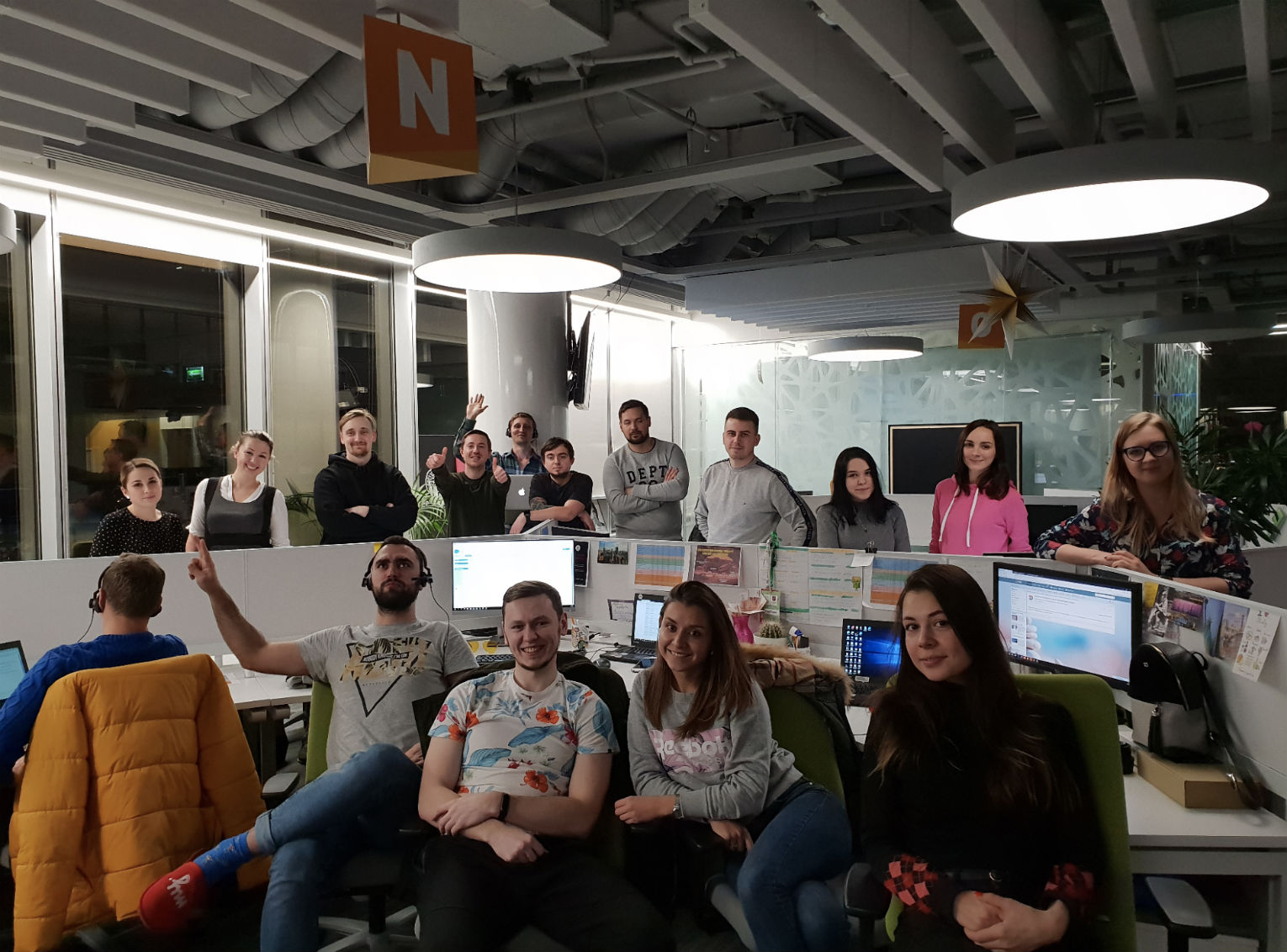
- What is the general motivation of teachers?
Programmers, people are usually wealthy, they have good salaries, and we objectively cannot compete on money with employers, where they get paid as programmers. Naturally, any work is paid, but for them it is not the most profitable cost per hour.
Teaching is such a thing that you yourself should like.
In reality, it is very interesting for many children to teach, it is interesting to help beginners, it is interesting to communicate with them, maybe even find an apprentice, take them to your startup.
What can I say, my partner Gaik Hayrapetyan was my first student on the very course of "PHP in two weeks." He became the best student, and we called him to help us.
Teaching is like playing football. What motivation can be - yes, I just love. Here it is exactly the same. Well, we, in turn, can offer money, students, and somehow digitize the success of your teaching.
- (Phil) And why methodologists are not working as developers. Is it their own choice?
We do not keep slaves, therefore, of course, it is their choice. I don’t know, Phil, whether you confirm or not, but there are stories when developers understand that they don’t want to do programming for the rest of their lives, they want to try themselves in something else.
Sometimes, programmers came to us to teach, they began to introduce a course, two, then three, then they took five courses and already worked full time on GeekBrains. We took them to the state, and they transformed into methodologists. Switched from development to another activity.
- But as you said, programmers are wealthy people. From an economic point of view, it is more profitable to develop further. Do they get from you the same way they would get to developers?
I do not know, it's hard to compare. If we talk about the level of the middle, then, probably, yes - about the same as they get.
But, for example, in Mail.ru there are super-seniors, they receive outrageous money, possessing absolutely unique expertise. Naturally, with our vacancy of a methodologist, we will not interrupt it.
But if we compare it with the average salary of a programmer in the market, then we have something similar.
Online courses vs universities
- Was it that you saw someone else’s course, and you were annoyed, how badly was it done?
You know, no, we are not annoyed about this. We have something to annoy without it.
But that was the starting point at all for creating a project. When I graduated from university, I thought that it was possible not to go through the same thing in six years and achieve it. I just wanted to give more knowledge to the audience.
- Do you see the problem in the educational system?
Honestly, I don’t really think about it from the position of the state. I personally am very grateful to the university, the experience he gave me.
Therefore, I do not know - there is no problem.
- Well, do you oppose your courses to this system? Do you need to study for six years or is it enough to complete the course?
Yes, we are an alternative to the university in terms of obtaining a profession. But I will never discourage a person from studying at a university if he has finished school and thinks what to do next - go to study, or immediately work, or for courses. I passed only one way in my life, and I don’t regret it, so it would be strange to dissuade.
But if we talk about our audience, then there come a lot of guys who have already received education - higher or secondary special. They realized at some point that programming was interesting to them. And it’s probably easier for such guys not to spend another five years on another university, but to spend a year in GeekBrains.
- Isn't it better to study yourself or immediately work and study in practice?
If the financial issue is not very serious, then it seems to me that the course is better. And if the cost is unbearable, then there is Google and a huge pile of free content. Even we have several hundred free webinars, free mini-courses that will definitely give a start. Of course, everything can be done independently.
Is it possible to become an expert in circumventing the classical path

- You have people who help students get a job after the courses. How does this happen?
First, with us, many companies want to be friends for the recruitment of interns. Our task is simply to reduce. When a course is recruited, either half or most of the students come to find a job. We survey and see if they fulfill this goal as they learn.
According to the latest metrics of annual education at Geek University, 70% are employed in the learning process. The remaining 30% is settled over the next three months.
Those who want to work, but cannot get settled - there are really very few of them. The demand for programmers is not bad. But we can help, if it still does not work, lead by the hand to the employer, help prepare a resume, tell how to behave during the interview.
- (Phil) There are two skills - the ability to work as a developer, and knowledge of the development, which will be useful to you only at the interview. How much influence on the program are things that are asked only at interviews?
As far as I understand, we are preparing just developers, without tricky preparations specifically for interviews. Are these any mutually exclusive skills? That is, I really should know different things on development?
- (Phil) Not mutually exclusive, but they do not overlap by 100%. If you set yourself a task to be well interviewed, you will not become a good developer, but you will pass.
No, of course, first of all we are preparing a programmer who will be fully-fledged at work, a full-fledged employee of his company.
- Inside there is an exam to make sure that the person is ready to work?
Yes, of course, course projects, and tests, knowledge slices. But as long as the employer does not want to take you to work, you are unlikely to get it. The maximum that we can give apart from knowledge about programming is to prepare you for an interview, to tell about the labor market.
- How fast can you become a developer from scratch to the level of June?
I think half a year is enough for you to become a juna.
- It seems to me that the idea that developers become easy is becoming more and more popular. And it seems to me that you are promoting it too, it seems, "become a programmer in two weeks."
"Programmer for two weeks" - this story is almost nine years. I then only realized that it was not. But it seemed to me absolutely sincerely that it was so. At one time I did not know the PHP language, and at the first job at an advertising agency I needed it. I took a textbook, sat for a day above it, and something simple came to me. Of course, I was an undergraduate, and I had the experience of other languages.
But now there are no more "two weeks" - that is what I am leading to. The most substantial big program that we recommend is annual training. There are programs easier and simpler, but they are also from six months. Half a year is really the time when you start to represent something.
- The most evil commentators of Habr will disagree, probably, with this. They will say that you will not become a developer in either half a year or a year. And many people think that because of such courses, when people study from scratch for half a year and come to work, the market breaks down. He becomes full of unqualified people.
I am not going to argue with Habr's commentators, believe me. Over the years, I have heard so many comments about everything we do, that I have no desire to argue.
Now I don’t have such that every day commentators say to me: “it’s impossible to learn programming in a year, that you are deceiving people!” Thank God, I don’t intersect with him.
- Do you get feedback from employers to whom people came from your courses?
Yes of course. They say let's more.
- Do you think you have occupied or created this niche?
When we first started to communicate with Mail, we just said that we want to create a market. At least we were definitely a driver. I do not know, maybe still remain. Many projects looked at us, and, probably, still look.
You do not believe how many former teachers of GeekBrains open their programming schools - I think about two or three dozen.
- There is such a joke that the best way to make a million is to tell how to make a million. Don't you think that leading courses is more about making money by naivety than actually teaching?
No, it does not. We do not teach and earn a million, we just give a profession.
- (Phil) You said that you should like teaching, even if you do not earn a lot from it. About the company can also be said?
I do not want to use loud words, such as "we are a family," but there is some general spirit. We are familiar with the founders of SkyEng, and we communicate well. They once said so about their company: “Listen, we are all a little twisted, we are like a sect, in a good way. We are very charged. "
And it seems to me that we are also in a certain sense a sect. We are also charged for something very good.
